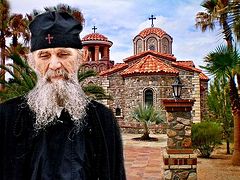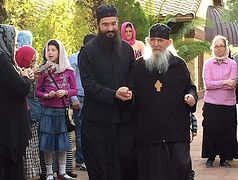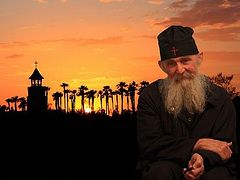Our most reverend Geronda,[1] our most beloved father!
It is so difficult for me—and for the entire brotherhood—to articulate even a single word about the departure of our great Father and Elder.
The best word for an elder of your stature, I believe, would be silence, love, reverence, prayer. That unceasing prayer, through which your heart was warmed with love for our Christ and our Panagia.[2] This prayer that he constantly urged us to say without ceasing. His voice can still be heard—and indeed we will all hear it forever in our consciences—“My child, say the prayer,[3] don’t stop, don’t speak, say it audibly.”
Today, Most Reverend Archbishop of America, Holy Hierarchs, reverend Abbots and Abbesses, and all my beloved brethren in Christ, we celebrate an event whose importance is self- apparent. For behold, “Rejoice, O chief shepherd, as you behold round about your table your children’s children, bearing branches of good works.”[4] And from the Prophet Isaiah: Lift up your eyes, reverend Elder, and see around you: behold, your children have assembled together to you like divinely-radiant luminaries, from the west and the north and the sea and the dawn, through you blessing Christ unto the ages,[5] sending you on ahead unto the desired homeland which you had ever before your eyes, to that moment you desired when you would be united with your beloved Christ, the Bridegroom of our souls. He always had his thoughts on the things on high; he passionately loved the heavenly and never bothered himself with anything earthly except the salvation of the souls of his spiritual children.
Geronda would say to us, “Always remember death, as if every day that dawns is your last day, and say to yourself, ‘Arise, go forth, my soul: Be silent, pray, seek reconciliation, love, weep with pain for your sins, for the end has arrived.’ As long as we have time, let us force ourselves, because this is what we will keep; all the rest will be scattered by the four winds. Pray also for me who say but do not do, and woe to me the thrice-wretched; which face of God will I see?”
That which is taking place today is indeed a little painful, because of the temporary bodily separation, but in many ways it is joyful because we have obtained a most powerful intercessor before God. Our Geronda did not die; he fell asleep and was translated to heaven, to the synodia[6] of his own Geronda, the ascetic Saint Joseph the Hesychast. He is being welcomed by the Holy Apostles, the Martyrs, the monastic Saints, the choir of the Angels, his guardian the Honorable Forerunner, our Panagia, and by the Master Christ, Whom he so loved, by the true light, the Holy Trinity. He walked with much faith and love and trust in the will of God, and now deservedly rests in the place prepared for his repose.
And now has come the hour of his departure. He expectantly waited for it and often mentioned it. And honestly, how long would he stay with us? How long could he endure being far from his own Geronda in the heavens? All possible bounds of human patience had been surpassed, his limitless love was offered richly to all. You suffered much, Holy Father, you endured pain and we along with you; you were slandered, you experienced rejection, you patiently endured the martyrdom of illness, you took up your heavy cross with faith in the mercy and the love of God, with great fortitude while glorifying the name of our Christ, and mostly in silence. Yet your voice, your teachings, remain as an invaluable treasure which you have entrusted to us, to exhort us in the struggle for virtue. Pray, Holy Elder, that we may follow in your footsteps, each according to his abilities.
You told us years ago that you would depart, but Christ extended the time for the sake of your beloved spiritual children. But today, the Master Christ desired to receive your grace-filled and luminous soul, pure and godly, from your much-suffering body. Today the long-desired day of your departure to the heavens has arrived. Most revered Geronda, angel on earth and heavenly man, today you leave this present world and join the heavenly, where the light of the Resurrection shines eternally, where the newborn heavenly Babe receives you into His manger,
He the incarnated Fashioner of creation. And your departure becomes a triumph and glorification of Christ the King. And as you related in one of your teachings, “The nous[7] feels the attraction and is drawn by the hymn ‘Christ is born, Glorify Him!’[8] My God, my Christ, words fail me; my heart is going to burst, how sweet You are! What can I say? My heart melts like wax, because I am unworthy in everything. But when, O when will I see You, my Father? Your sweetness surpasses all reason and understanding.”
Our own feelings, however, are rather mixed. Peaceful tears, and a joyful sadness reigns within us. Today we see off to the throne of God a protector and intercessor, a new pillar of our Church. We have obtained a saint who struggled in the caves and huts of Small Saint Anne’s[9] and excelled in obedience as very few have done. We have obtained an Equal-to-the-Apostles who tirelessly tilled the soil of America and Canada, bringing forth immortal souls, reborn through repentance and confession. His words—simple, fiery, deeply spiritual—reached the ends of the world. We have obtained a martyr who suffered all manner of trials from his fellow-man, but also from his unseen enemies. Our most beloved Geronda, upright is your heart, straight is your path. Holy is your memory, blessed is your remembrance.
All of us are recipients of your gentleness, of your ever-joyful countenance, of the cheerfulness of your words, of your Christ-centered teaching, of the graciousness of your character, of your sweetness, of your meekness and your extreme Christ-like humility towards all.
Truly, who met you and did not love you? Who spoke with you, bowed beneath your epitrachelion,[10] and did not feel their heart sweetened? All desired to be with and near you. All who approached you underwent a positive change and drew from the inexhaustible fountain of divine grace, which continuously gushed forth from your godly soul and overflowed not only for those close to you but even those afar off who were in need. All desired to be with you, near you. Everyone, and especially the simple hearts who discerned in you your clear and bright purity.
We beg you, our most holy Father and dearly beloved Geronda, “The chariot of Israel and its horses!”[11] do not leave us orphans, but ever intercede to the Lord on behalf of us all, the humble brotherhoods under you, and all who have come today here to your funeral service to give one last prostration and venerate your grace-filled and sanctified hands, ever raised in prayer and intercessions for us, for our homeland, for all the world and the church.
And finally, emulating your courteousness, Geronda, I express warm thanks to His Eminence Archbishop of America Elpidophoros, to the other hierarchs, to the abbots and abbesses and the other brethren, and especially His All-Holiness, the Ecumenical Patriarch Bartholomew, represented by the Right Reverend Abbot of the Holy Monastery of Philotheou of the Holy Mountain Archimandrite Nikodemos, for his paternal and patriarchal blessings and his words of consolation to our brotherhood in Christ.
Eternal be the memory of our most reverend Geronda and Father and Abbot, Archimandrite Ephraim the Hieromonk.
Our Elder and Father Ephraim has fallen asleep, the boast of the monastics. May he be remembered with renown from the mouths of thousands.[12]
Used with permission from the Monastery of St. Anthony the Great




